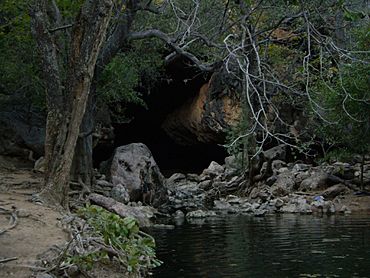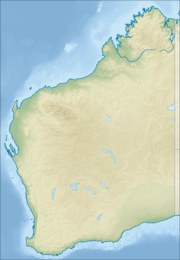Tunnel Creek National Park facts for kids
Quick facts for kids Tunnel Creek National ParkWestern Australia |
|
|---|---|
|
IUCN Category II (National Park)
|
|

Tunnel Creek in the Kimberley Region of Western Australia
|
|
| Nearest town or city | Derby |
| Established | 1992 |
| Area | 91 ha (225 acres) |
| Managing authorities | Department of Environment and Conservation |
| Website | Tunnel Creek National Park |
| See also | List of protected areas of Western Australia |
Tunnel Creek National Park is a special protected area in the Kimberley region of Western Australia. It's about 1845 kilometers northeast of Perth and 390 kilometers east of Broome. The main attraction here is a natural cave where Tunnel Creek flows right through it!
Inside the cave, you can see many ancient rock paintings made by Aboriginal people. There are also cool rock formations called speleothems. This cave was once a secret hideout for a brave Aboriginal warrior named Jandamarra. He was killed near the cave entrance in 1897. This park is part of the larger Balili (Devonian Reef) Conservation Park.
Exploring Tunnel Creek National Park
This park is located in the Napier Range and covers an area of 91 hectares (about 225 acres). The Napier Range is made of limestone. This limestone is what's left of an ancient Devonian reef system. This reef formed around 350 million years ago, which is a very long time ago!
The Amazing Tunnel Cave
The tunnel part of Tunnel Creek is about 750 meters long. It runs completely underground. This makes it one of the oldest cave systems in Western Australia. The reef first appeared above water about 250 million years ago. The first caves started forming then. The caves we see today were created about 20 million years ago.
The cave can be as tall as 12 meters and as wide as 15 meters. It used to be called "The Cave of the Bats" because at least five different types of bats live there. You'll also find large pools of water on the cave floor. Sometimes, freshwater crocodiles are seen in these pools!
The water pools show that the water table (the level of water underground) is very close to the cave floor. Water only flows strongly through the cave after heavy rainfall.
See also
 In Spanish: Parque nacional Arroyo Túnel para niños
In Spanish: Parque nacional Arroyo Túnel para niños
 | Lonnie Johnson |
 | Granville Woods |
 | Lewis Howard Latimer |
 | James West |


